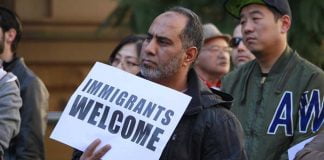The intervention is more than a policy about what happens within 78 “prescribed communities”. It is a radical new ideology that combines a fierce new push for assimilation of Aboriginal people with a rapid pro-market economic agenda.
Through the intervention the government is trying to bury the ideas of Aboriginal self-determination and meaningful land rights.
The seizure of Aboriginal land, assets and social security entitlements in the NT is an attack on all Indigenous people. The lie that “self-determination has failed” is already putting renewed pressure on Aboriginal control over services and policy from Katherine to Redfern.
This is why we need a united campaign against the intervention—to smash this resurgent racism, and to put Aboriginal rights back on the agenda. Fighting this legislation is not just a struggle for Aboriginal people. It is something that all unions need to resist, that all human rights and social justice organisations must be campaigning against.
Kevin Rudd and Jenny Macklin are trying to divide people in Australia through the intervention. They are entrenching the idea that suspension of basic human rights can lead to positive change.
The racist “blame the victim” rhetoric of the intervention takes the focus off government neglect and sets workers and marginalised people against each other. This is seen most clearly through the extension of welfare quarantining to non-Aboriginal people in the WA suburb of Cannington, trials which could soon be extended nationally.
Macklin and Rudd’s intervention revealed
At the 2008 Canberra Convergence people mobilised in shock and confusion against Mal Brough’s militarised assault that had just been rolled out in the NT. A year later we are clearly fighting Macklin and Rudd’s policies.
Rudd and Macklin came to office claiming that their support for the intervention was “not ideologically motivated” and that they were taking an “evidence-based approach”.
But they rejected evidence from their own hand-picked review team that demonstrated millions had been wasted on bureaucrats and that the imposed measures were having disastrous impacts on Aboriginal people’s self-esteem.
There is also mounting evidence that hardship from the welfare quarantine is responsible for increasing anemia rates, low birth-weights and other health problems.
By refusing to act on the review’s recommendations to loosen the “Income Management” regime and reinstate the Racial Discrimination Act (RDA) for at least 12 months, the Rudd government has signaled its long-term commitment to these measures. Over the next year the campaign needs to ensure public opinion is pulled hard against any form of welfare quarantining and the entirety of the intervention package.
Build the campaign
Increasingly the progressive Australia that walked for reconciliation in 2000 is seeing the intervention for what it is and becoming deeply disappointed at the firm commitment of the Labor government to such regressive measures.
For International Human Rights Day in December, the campaign produced a statement calling for an end to the intervention. This hit a chord, with ANTaR groups sending it around the country, and endorsees ranging from unions to state reconciliation councils, Young Labor and a range of social justice groups like the Edmund Rice Centre and the National Welfare Rights Newtork.
We have also seen an increasingly public stance being taken by prominent Aboriginal leaders like Patrick Dodson and Pat Anderson. Opposition from such broad sections of Australian society is extremely encouraging.
But even amidst growing outrage, as the policies seem to become more entrenched some opponents risk becoming despondent. With the intervention in the media less after the release of the review, the movement must find ways to maintain pressure and momentum.
We need to build the anti-intervention campaign groups that exist in most cities. Groups need to be built publicly and broadly amongst both Aboriginal and non-Aboriginal networks to tie together national resistance to the racism. These collectives have a crucial role to play in transforming the “on paper” opposition of major NGOs and unions into active pressure on the government.
Direct actions can keep the spotlight on the NT and show what kind of fight is needed.
We need pickets of Macklin wherever she talks. Occupations of the Department of Family and Community Services can be built alongside the film screenings and speaking tours that expose people to the realities of the intervention.
Finding ways to consistently mobilise all opponents of the intervention will help prepare the ground for the national mass rallies that will be needed to seriously set back the current assault on Aboriginal rights.
By Jean Parker





